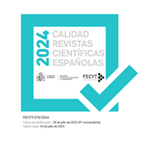Construcción discursiva de la subjetividad en lengua inglesa: Cuando los viajeros se quejan a través de sus opiniones en TripAdvisor
Resumen
En este artículo analizamos las quejas de los viajeros en un corpus integrado por 80 opiniones o reseñas sobre cuatro hoteles, alojadas en la plataforma TripAdvisor en las categorías de puntuación “malo/pésimo” y “bueno/excelente”. El estudio se enmarca en el análisis del discurso interpersonal aplicado a géneros turísticos digitales (Mapelli 2008, 2016, Suau Jiménez 2011, 2012a, 2012b, 2014), con el propósito de caracterizar no solo el aspecto relacional entre autor y lector, sino también el proposicional o de contenido. Nos centramos en las quejas, ya que constituyen una parte fundamental de las opiniones. Abordamos la construcción de la subjetividad en la voz de los viajeros –del autor- a partir de la revisión de los marcadores de actitud, por aglutinar estos a la vez riqueza subjetiva y de contenido. Sin embargo, también consideramos los atenuadores, los realzadores y la auto-mención como marcadores interpersonales que participan en la modelación de dichas quejas. Los resultados apuntan hacia una construcción diferenciada de la subjetividad en las dos categorías analizadas, positiva y negativa, de TripAdvisor. Se sugiere que las estrategias discursivas resultantes obedecen al marco funcional pre-determinado por el fin comunicativo de cada categoría de opinión. Las implicaciones son de orden discursivo, metodológico y socio-lingüístico.Descargas
Descarga artículo
Licencia
La revista Círculo de Lingüística Aplicada a la Comunicación, para fomentar el intercambio global del conocimiento, facilita el acceso sin restricciones a sus contenidos desde el momento de su publicación en la presente edición electrónica, y por eso es una revista de acceso abierto. Los originales publicados en esta revista son propiedad de la Universidad Complutense de Madrid y es obligatorio citar su procedencia en cualquier reproducción total o parcial. Todos los contenidos se distribuyen bajo una licencia de uso y distribución Creative Commons Reconocimiento 4.0 (CC BY 4.0). Esta circunstancia ha de hacerse constar expresamente de esta forma cuando sea necesario. Puede consultar la versión informativa y el texto legal de la licencia.











